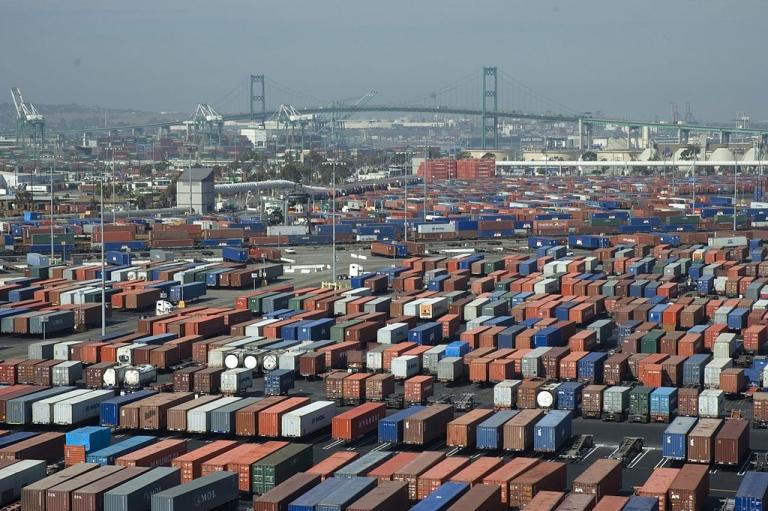Most American conservatives today are committed to free market capitalism, which includes free trade and opposition to tariffs. By that standard, Donald Trump, who advocates a protectionist economic policy and who is imposing steep tariffs in his trade war with China, is not a conservative. But there is another conservative ideology, an historically older version, that employed tariffs as part of its nation-building agenda.
The “paleo-conservative” Pat Buchanan tells the tale. From Patrick J. Buchanan, “Tariffs — The Taxes That Made America Great”:
A tariff may be described as a sales or consumption tax the consumer pays, but tariffs are also a discretionary and an optional tax.
If you choose not to purchase Chinese goods and instead buy comparable goods made in other nations or the USA, then you do not pay the tariff.
China loses the sale. This is why Beijing, which runs $350 billion to $400 billion in annual trade surpluses at our expense is howling loudest. Should Donald Trump impose that 25% tariff on all $500 billion in Chinese exports to the USA, it would cripple China’s economy. Factories seeking assured access to the U.S. market would flee in panic from the Middle Kingdom. . . .
A tariff is a tax, but its purpose is not just to raise revenue but to make a nation economically independent of others, and to bring its citizens to rely upon each other rather than foreign entities. . . .
Once a nation is hooked on the cheap goods that are the narcotic free trade provides, it is rarely able to break free. The loss of its economic independence is followed by the loss of its political independence, the loss of its greatness and, ultimately, the loss of its national identity.
Read the entire essay, which rehearses how the lawmakers of the American founding imposed tariffs on English goods in a successful effort to build American industry. He gives other historical examples, going so far as to claim that all great economic powers used tariffs, and that “free trade is the policy of fading and failing powers, past their prime.”
So there is a conservative case to be made for tariffs.
Free market economics is, technically, “liberal” economics, from the Latin word for “free.” Despite my joking here in Australia about their being “upside down” in calling their Conservative party the “Liberal Party,” actually, they are correct. The “liberal” kind of conservatism–stressing free markets, limited government, and individual freedom–is the kind that is dominant in American politics too. It has much to commend it, though its emphasis on liberty isn’t very effective in conserving culture against “progressive” changes such as the sexual revolution.
But reverting to a “mercantilist” economy would be disruptive to our current economy just as adopting a “socialist” economy would be (though not nearly so destructive). It would no doubt be virtuous to break our addiction to the “narcotic” of “cheap goods.” But that would mean a noticeable drop in our standard of living, and who among us today is so virtuous as to embrace that?
It would also be virtuous for Americans to “rely upon each other rather than foreign entities.” But that would come at the cost of smaller markets and diminished prosperity for American companies, and would it really be virtuous to embrace that?
The United States of America is large enough and dynamic enough to develop a more self-sufficient economic system. As it is, one can hardly buy American-made clothing or electronic gadgets, since they can more cheaply be manufactured elsewhere. But tariffs could add so much to the price of the things we buy at Wal-Mart and Amazon.com that eventually American companies could rush into the void and start making them again.
But dismantling free trade is a two-way street. The countries we impose them on respond by imposing them on our products. American farmers and manufacturers sell their goods around the world. A mercantilist economy, in which Americans “rely on each other” in their buying and selling would operate in a much-smaller market. Caterpillar would sell far less earthmoving equipment if they could sell it only in America. That would mean fewer jobs and less prosperity.
You can also make a moral case for free global markets. American and other farmers have nearly eliminated famine and starvation in the world, thanks to their ability to provide cheap food in a global marketplace. Poverty, both in the U.S. and around the globe, is mitigated thanks to those “cheap goods,” which raises the living standards of everyone.
To be sure, Trump’s tariffs against China are less a reversion to mercantilism than a tactic in a trade war. The long-range purpose is to force China to lower its trade barriers and unfair practices. The goal of Trump’s tariffs, ironically, is evidently free trade. When one side has few trade barriers while the other side has lots of them, that is not free trade.
So the ideological issues are not as black-and-white as they might seem. But it’s good to recall that conservatism does not necessarily have to mean a commitment to laissez-faire economics wherever it leads. Also that conserving prosperity, conserving economic liberty, and conserving personal freedom are all important for conserving American culture.
Photo: Port of Long Beach by Charles Csavossy [Public domain] via Wikimedia Commons













